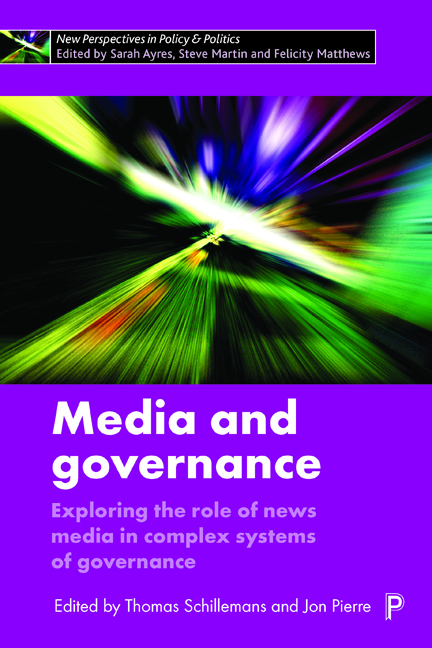Book contents
- Frontmatter
- Contents
- List of figures and tables
- Notes on contributors
- Introduction: Entangling and disentangling governance and the media
- one Governance and the media: exploring the linkages
- two Media and public accountability: typology and research agenda
- three Political control or legitimacy deficit? Bureaucracies’ symbolic responses to bottom-up public pressure
- four Mediatised local government: social media activity and media strategies among local government officials 1989–2010
- five Fighting or fumbling with the beast? The mediatisation of public sector agencies in Australia and the Netherlands
- six The mediatisation of university governance: a theoretical and empirical exploration of some side effects
- seven Managing commercialised media attention in complex governance networks: positive and negative effects on network performance
- eight Over-responsibilised and over-blamed: elected actors in media reporting on network governance. A comparative analysis in eight European metropolitan areas
- Index
four - Mediatised local government: social media activity and media strategies among local government officials 1989–2010
Published online by Cambridge University Press: 19 April 2022
- Frontmatter
- Contents
- List of figures and tables
- Notes on contributors
- Introduction: Entangling and disentangling governance and the media
- one Governance and the media: exploring the linkages
- two Media and public accountability: typology and research agenda
- three Political control or legitimacy deficit? Bureaucracies’ symbolic responses to bottom-up public pressure
- four Mediatised local government: social media activity and media strategies among local government officials 1989–2010
- five Fighting or fumbling with the beast? The mediatisation of public sector agencies in Australia and the Netherlands
- six The mediatisation of university governance: a theoretical and empirical exploration of some side effects
- seven Managing commercialised media attention in complex governance networks: positive and negative effects on network performance
- eight Over-responsibilised and over-blamed: elected actors in media reporting on network governance. A comparative analysis in eight European metropolitan areas
- Index
Summary
Social media and local government
The advent of social media such as Facebook, Twitter and blogs provide government institutions with both challenges and opportunities (Klang and Nolin, 2011; Magro, 2012). On the one hand there is potential to increasing legitimacy through involvement, collaboration and dialogue (Knox, 2013). Social media allows citizens to communicate directly with government institutions and government actors may respond directly to the public. However, there are also difficulties with accommodating large flows of direct public feedback into public organisations (Knox, 2013).
What is more important is that social media may alter the power relations between conventional media institutions (press, radio and television) and government actors, that is, transforming the very trajectory of mediatisation itself (for example, Schulz, 2004; Miller, 2014). Social media provide the political elite with opportunities to circumvent the filtering and gatekeeping practices of professional news organisations and communicate directly with citizens. This poses a challenge to the power of conventional media and the dominant news media logic; that of professional journalism in press, radio and television.
To date, most studies on how government actors relate to social media have focused on national elections and politics (for example, Schweitzer, 2011; Southern, 2014) while local government has received less attention (Larsson, 2013). The key issues to explore in this context are thus if social media have similar implications for local governance as studies suggest they have at the national level, and to what extent the advent of social media has changed the ways in which local politicians and bureaucrats relate to the news media, particularly the local press. Our main research questions are thus how local political and administrative elites relate to the media, and to what extent social media complement or replace conventional news media in local governments’ public communication.
This chapter first examines the development of local governmentmedia relations across time, on the basis of a unique survey-based data set comparing the local political and administrative leadership's media strategies in 1989 and 2010. We surveyed the local senior political and administrative leadership in all municipalities in Sweden, including the Chairman of the Executive Board (CEB) who is the top elected politician and de facto mayor of the city; the city manager (the top, non-elected, public servant and the Head of the city administration); and the financial manager (the senior economic manager in the city administration).
- Type
- Chapter
- Information
- Media and GovernanceExploring the Role of News Media in Complex Systems of Governance, pp. 77 - 100Publisher: Bristol University PressPrint publication year: 2019



